AHIS204 Essay: Philip II, Alexander & the Macedonian Empire Era
VerifiedAdded on 2023/03/30
|8
|1776
|354
Essay
AI Summary
This essay delves into the reign of Philip II and his complex relationship with Athens, highlighting his military strategies and diplomatic efforts to consolidate power in the Macedonian Empire. It explores his reorganization of the Macedonian infantry, his engagement in the Third Sacred War, and his strategic dealings with Athenian politicians. The analysis extends to the dynamics between Philip II and Athens, marked by treaties, conflicts, and the eventual establishment of Macedonian pre-eminence in Greece. Furthermore, the essay examines the Corinthian League and the political climate that favored unity against external threats, as well as the circumstances surrounding Philip II's assassination and its impact on the empire. The essay concludes by emphasizing Philip II's success in transforming Macedon into a dominant force while navigating rivalries and maintaining Greek interests, ultimately setting the stage for the reign of Alexander the Great.
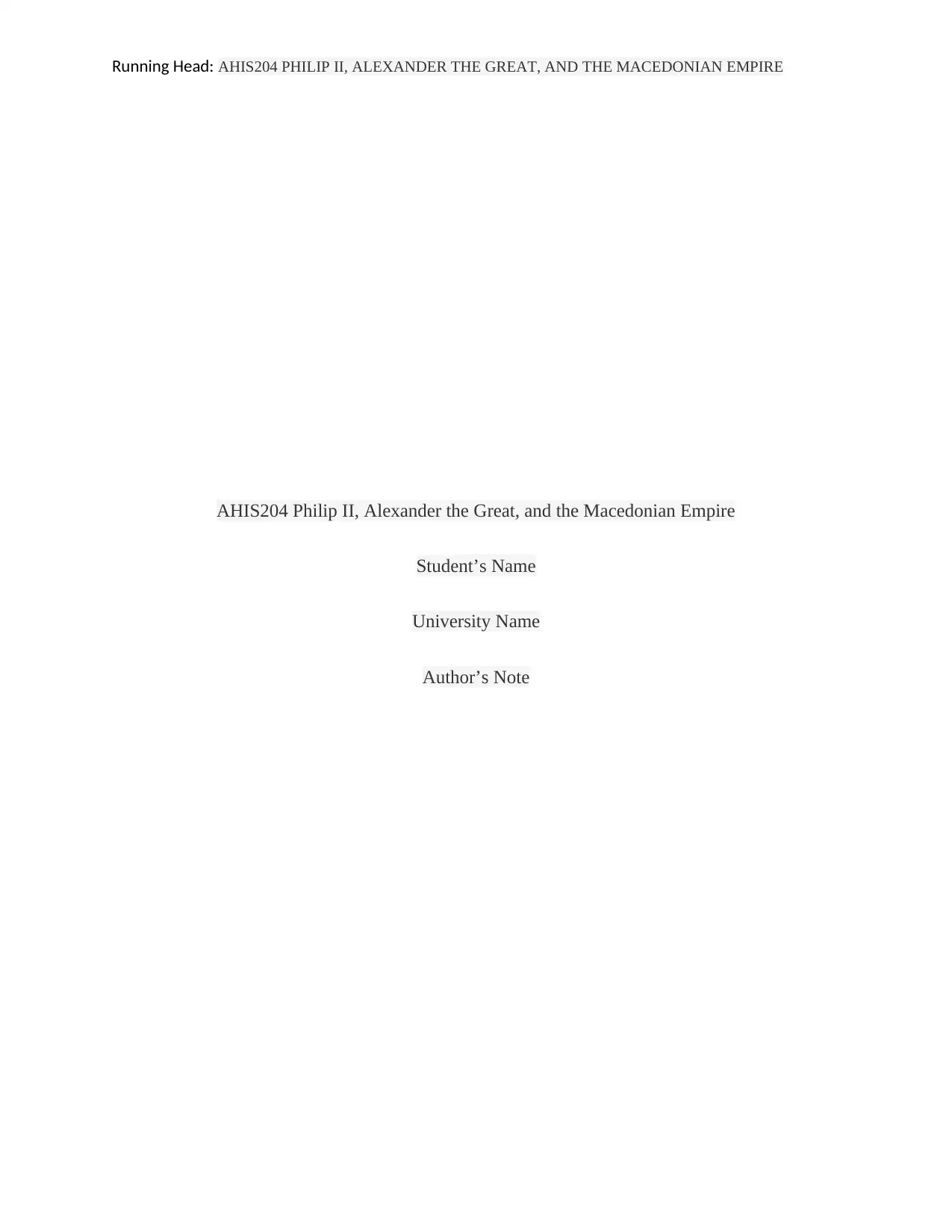
Running Head: AHIS204 PHILIP II, ALEXANDER THE GREAT, AND THE MACEDONIAN EMPIRE
AHIS204 Philip II, Alexander the Great, and the Macedonian Empire
Student’s Name
University Name
Author’s Note
AHIS204 Philip II, Alexander the Great, and the Macedonian Empire
Student’s Name
University Name
Author’s Note
Paraphrase This Document
Need a fresh take? Get an instant paraphrase of this document with our AI Paraphraser
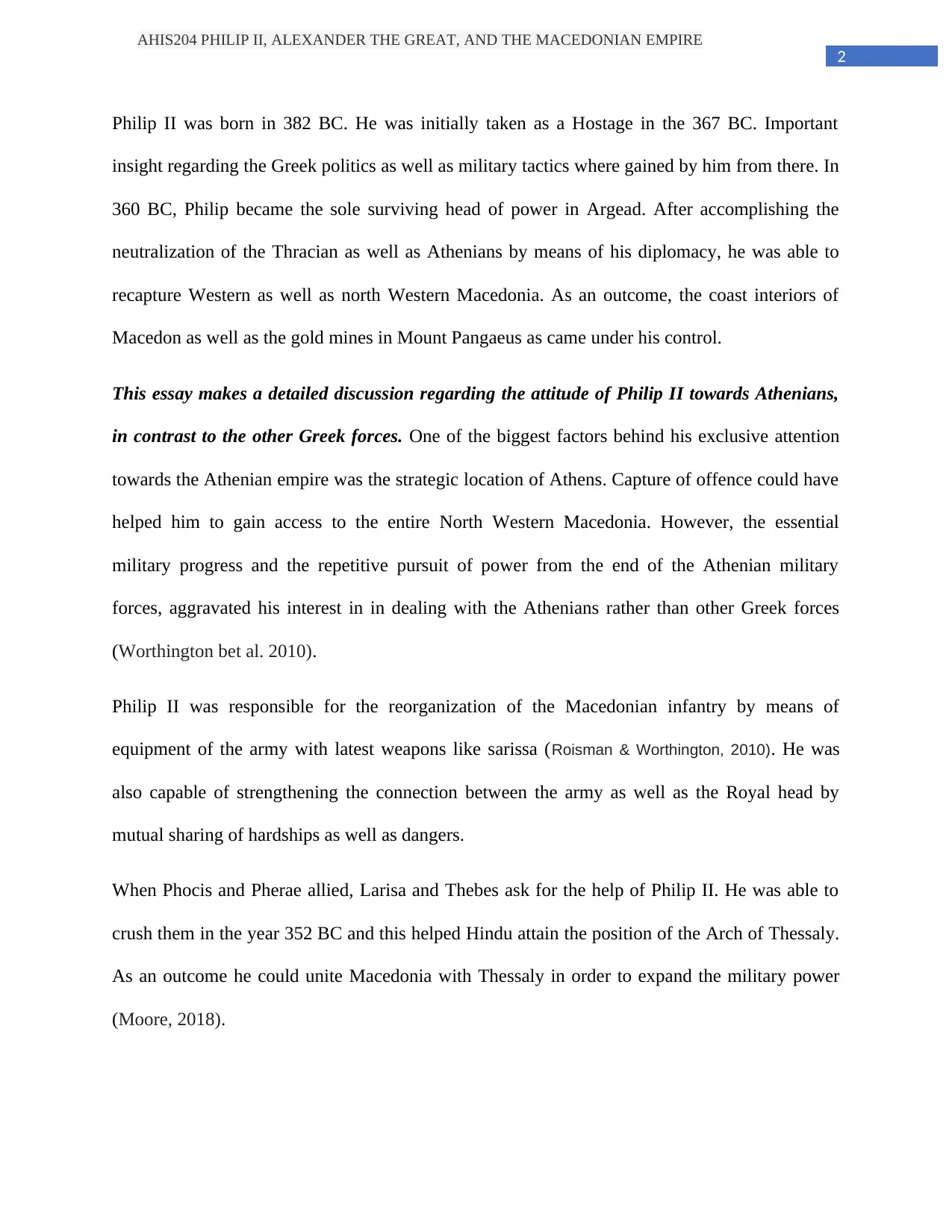
2
AHIS204 PHILIP II, ALEXANDER THE GREAT, AND THE MACEDONIAN EMPIRE
Philip II was born in 382 BC. He was initially taken as a Hostage in the 367 BC. Important
insight regarding the Greek politics as well as military tactics where gained by him from there. In
360 BC, Philip became the sole surviving head of power in Argead. After accomplishing the
neutralization of the Thracian as well as Athenians by means of his diplomacy, he was able to
recapture Western as well as north Western Macedonia. As an outcome, the coast interiors of
Macedon as well as the gold mines in Mount Pangaeus as came under his control.
This essay makes a detailed discussion regarding the attitude of Philip II towards Athenians,
in contrast to the other Greek forces. One of the biggest factors behind his exclusive attention
towards the Athenian empire was the strategic location of Athens. Capture of offence could have
helped him to gain access to the entire North Western Macedonia. However, the essential
military progress and the repetitive pursuit of power from the end of the Athenian military
forces, aggravated his interest in in dealing with the Athenians rather than other Greek forces
(Worthington bet al. 2010).
Philip II was responsible for the reorganization of the Macedonian infantry by means of
equipment of the army with latest weapons like sarissa (Roisman & Worthington, 2010). He was
also capable of strengthening the connection between the army as well as the Royal head by
mutual sharing of hardships as well as dangers.
When Phocis and Pherae allied, Larisa and Thebes ask for the help of Philip II. He was able to
crush them in the year 352 BC and this helped Hindu attain the position of the Arch of Thessaly.
As an outcome he could unite Macedonia with Thessaly in order to expand the military power
(Moore, 2018).
AHIS204 PHILIP II, ALEXANDER THE GREAT, AND THE MACEDONIAN EMPIRE
Philip II was born in 382 BC. He was initially taken as a Hostage in the 367 BC. Important
insight regarding the Greek politics as well as military tactics where gained by him from there. In
360 BC, Philip became the sole surviving head of power in Argead. After accomplishing the
neutralization of the Thracian as well as Athenians by means of his diplomacy, he was able to
recapture Western as well as north Western Macedonia. As an outcome, the coast interiors of
Macedon as well as the gold mines in Mount Pangaeus as came under his control.
This essay makes a detailed discussion regarding the attitude of Philip II towards Athenians,
in contrast to the other Greek forces. One of the biggest factors behind his exclusive attention
towards the Athenian empire was the strategic location of Athens. Capture of offence could have
helped him to gain access to the entire North Western Macedonia. However, the essential
military progress and the repetitive pursuit of power from the end of the Athenian military
forces, aggravated his interest in in dealing with the Athenians rather than other Greek forces
(Worthington bet al. 2010).
Philip II was responsible for the reorganization of the Macedonian infantry by means of
equipment of the army with latest weapons like sarissa (Roisman & Worthington, 2010). He was
also capable of strengthening the connection between the army as well as the Royal head by
mutual sharing of hardships as well as dangers.
When Phocis and Pherae allied, Larisa and Thebes ask for the help of Philip II. He was able to
crush them in the year 352 BC and this helped Hindu attain the position of the Arch of Thessaly.
As an outcome he could unite Macedonia with Thessaly in order to expand the military power
(Moore, 2018).
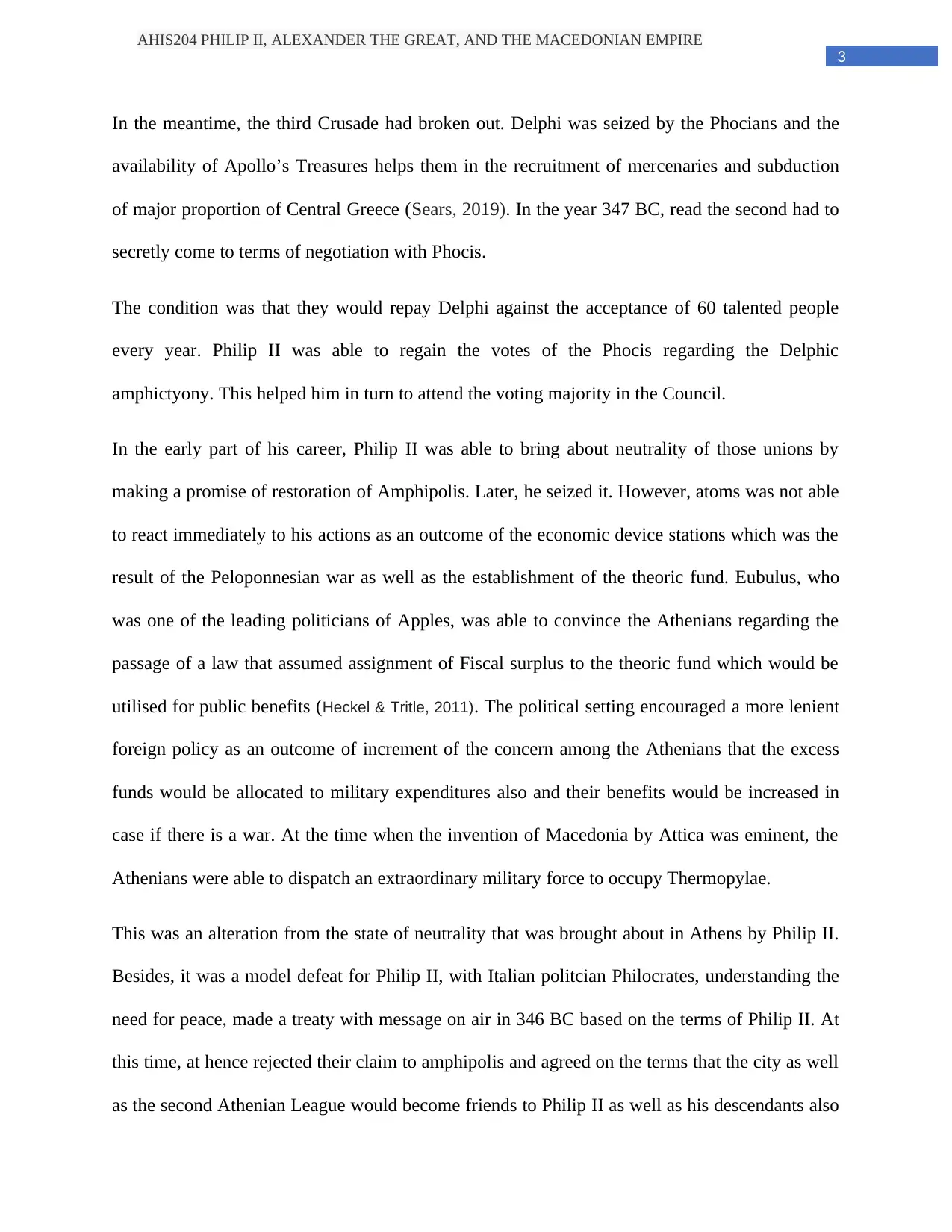
3
AHIS204 PHILIP II, ALEXANDER THE GREAT, AND THE MACEDONIAN EMPIRE
In the meantime, the third Crusade had broken out. Delphi was seized by the Phocians and the
availability of Apollo’s Treasures helps them in the recruitment of mercenaries and subduction
of major proportion of Central Greece (Sears, 2019). In the year 347 BC, read the second had to
secretly come to terms of negotiation with Phocis.
The condition was that they would repay Delphi against the acceptance of 60 talented people
every year. Philip II was able to regain the votes of the Phocis regarding the Delphic
amphictyony. This helped him in turn to attend the voting majority in the Council.
In the early part of his career, Philip II was able to bring about neutrality of those unions by
making a promise of restoration of Amphipolis. Later, he seized it. However, atoms was not able
to react immediately to his actions as an outcome of the economic device stations which was the
result of the Peloponnesian war as well as the establishment of the theoric fund. Eubulus, who
was one of the leading politicians of Apples, was able to convince the Athenians regarding the
passage of a law that assumed assignment of Fiscal surplus to the theoric fund which would be
utilised for public benefits (Heckel & Tritle, 2011). The political setting encouraged a more lenient
foreign policy as an outcome of increment of the concern among the Athenians that the excess
funds would be allocated to military expenditures also and their benefits would be increased in
case if there is a war. At the time when the invention of Macedonia by Attica was eminent, the
Athenians were able to dispatch an extraordinary military force to occupy Thermopylae.
This was an alteration from the state of neutrality that was brought about in Athens by Philip II.
Besides, it was a model defeat for Philip II, with Italian politcian Philocrates, understanding the
need for peace, made a treaty with message on air in 346 BC based on the terms of Philip II. At
this time, at hence rejected their claim to amphipolis and agreed on the terms that the city as well
as the second Athenian League would become friends to Philip II as well as his descendants also
AHIS204 PHILIP II, ALEXANDER THE GREAT, AND THE MACEDONIAN EMPIRE
In the meantime, the third Crusade had broken out. Delphi was seized by the Phocians and the
availability of Apollo’s Treasures helps them in the recruitment of mercenaries and subduction
of major proportion of Central Greece (Sears, 2019). In the year 347 BC, read the second had to
secretly come to terms of negotiation with Phocis.
The condition was that they would repay Delphi against the acceptance of 60 talented people
every year. Philip II was able to regain the votes of the Phocis regarding the Delphic
amphictyony. This helped him in turn to attend the voting majority in the Council.
In the early part of his career, Philip II was able to bring about neutrality of those unions by
making a promise of restoration of Amphipolis. Later, he seized it. However, atoms was not able
to react immediately to his actions as an outcome of the economic device stations which was the
result of the Peloponnesian war as well as the establishment of the theoric fund. Eubulus, who
was one of the leading politicians of Apples, was able to convince the Athenians regarding the
passage of a law that assumed assignment of Fiscal surplus to the theoric fund which would be
utilised for public benefits (Heckel & Tritle, 2011). The political setting encouraged a more lenient
foreign policy as an outcome of increment of the concern among the Athenians that the excess
funds would be allocated to military expenditures also and their benefits would be increased in
case if there is a war. At the time when the invention of Macedonia by Attica was eminent, the
Athenians were able to dispatch an extraordinary military force to occupy Thermopylae.
This was an alteration from the state of neutrality that was brought about in Athens by Philip II.
Besides, it was a model defeat for Philip II, with Italian politcian Philocrates, understanding the
need for peace, made a treaty with message on air in 346 BC based on the terms of Philip II. At
this time, at hence rejected their claim to amphipolis and agreed on the terms that the city as well
as the second Athenian League would become friends to Philip II as well as his descendants also
⊘ This is a preview!⊘
Do you want full access?
Subscribe today to unlock all pages.

Trusted by 1+ million students worldwide
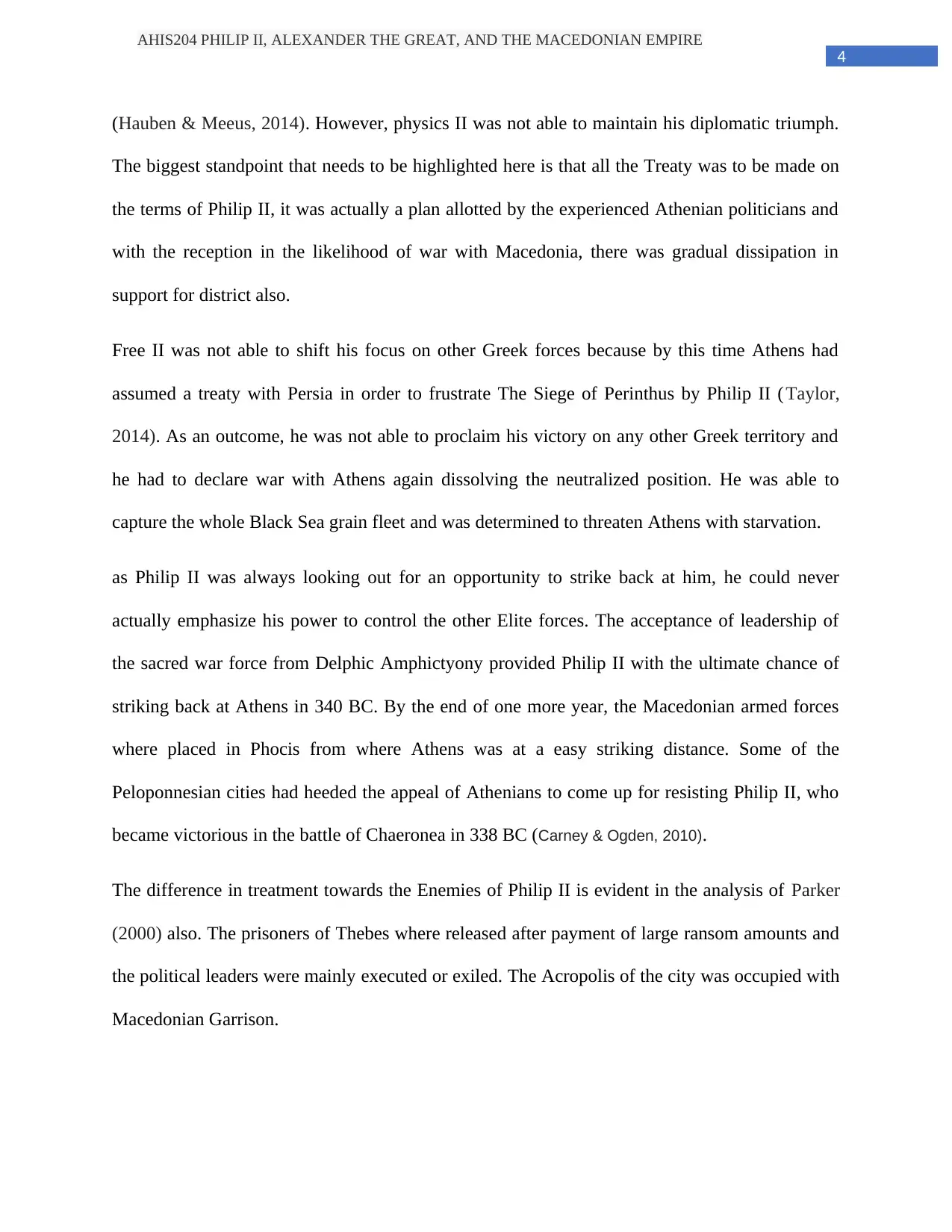
4
AHIS204 PHILIP II, ALEXANDER THE GREAT, AND THE MACEDONIAN EMPIRE
(Hauben & Meeus, 2014). However, physics II was not able to maintain his diplomatic triumph.
The biggest standpoint that needs to be highlighted here is that all the Treaty was to be made on
the terms of Philip II, it was actually a plan allotted by the experienced Athenian politicians and
with the reception in the likelihood of war with Macedonia, there was gradual dissipation in
support for district also.
Free II was not able to shift his focus on other Greek forces because by this time Athens had
assumed a treaty with Persia in order to frustrate The Siege of Perinthus by Philip II ( Taylor,
2014). As an outcome, he was not able to proclaim his victory on any other Greek territory and
he had to declare war with Athens again dissolving the neutralized position. He was able to
capture the whole Black Sea grain fleet and was determined to threaten Athens with starvation.
as Philip II was always looking out for an opportunity to strike back at him, he could never
actually emphasize his power to control the other Elite forces. The acceptance of leadership of
the sacred war force from Delphic Amphictyony provided Philip II with the ultimate chance of
striking back at Athens in 340 BC. By the end of one more year, the Macedonian armed forces
where placed in Phocis from where Athens was at a easy striking distance. Some of the
Peloponnesian cities had heeded the appeal of Athenians to come up for resisting Philip II, who
became victorious in the battle of Chaeronea in 338 BC (Carney & Ogden, 2010).
The difference in treatment towards the Enemies of Philip II is evident in the analysis of Parker
(2000) also. The prisoners of Thebes where released after payment of large ransom amounts and
the political leaders were mainly executed or exiled. The Acropolis of the city was occupied with
Macedonian Garrison.
AHIS204 PHILIP II, ALEXANDER THE GREAT, AND THE MACEDONIAN EMPIRE
(Hauben & Meeus, 2014). However, physics II was not able to maintain his diplomatic triumph.
The biggest standpoint that needs to be highlighted here is that all the Treaty was to be made on
the terms of Philip II, it was actually a plan allotted by the experienced Athenian politicians and
with the reception in the likelihood of war with Macedonia, there was gradual dissipation in
support for district also.
Free II was not able to shift his focus on other Greek forces because by this time Athens had
assumed a treaty with Persia in order to frustrate The Siege of Perinthus by Philip II ( Taylor,
2014). As an outcome, he was not able to proclaim his victory on any other Greek territory and
he had to declare war with Athens again dissolving the neutralized position. He was able to
capture the whole Black Sea grain fleet and was determined to threaten Athens with starvation.
as Philip II was always looking out for an opportunity to strike back at him, he could never
actually emphasize his power to control the other Elite forces. The acceptance of leadership of
the sacred war force from Delphic Amphictyony provided Philip II with the ultimate chance of
striking back at Athens in 340 BC. By the end of one more year, the Macedonian armed forces
where placed in Phocis from where Athens was at a easy striking distance. Some of the
Peloponnesian cities had heeded the appeal of Athenians to come up for resisting Philip II, who
became victorious in the battle of Chaeronea in 338 BC (Carney & Ogden, 2010).
The difference in treatment towards the Enemies of Philip II is evident in the analysis of Parker
(2000) also. The prisoners of Thebes where released after payment of large ransom amounts and
the political leaders were mainly executed or exiled. The Acropolis of the city was occupied with
Macedonian Garrison.
Paraphrase This Document
Need a fresh take? Get an instant paraphrase of this document with our AI Paraphraser
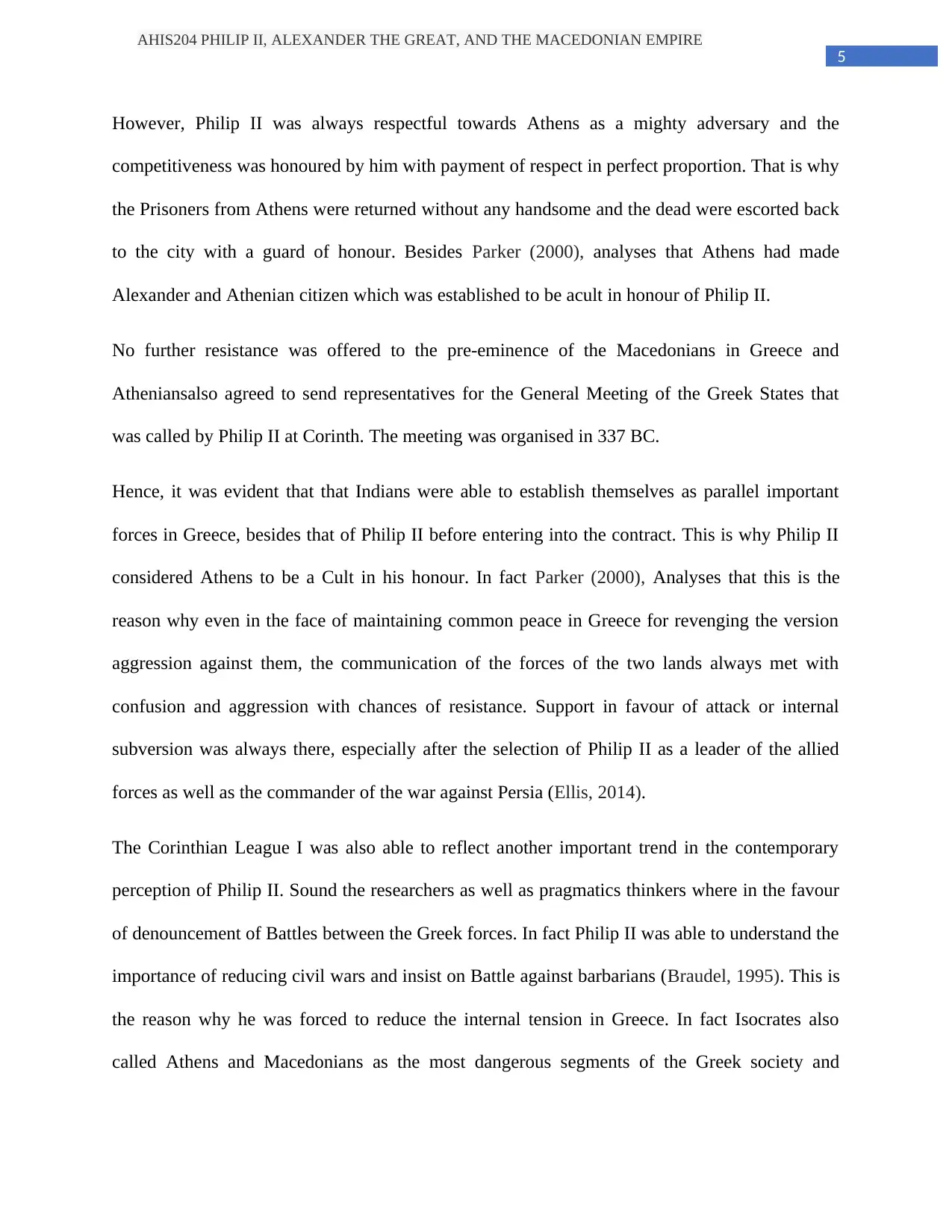
5
AHIS204 PHILIP II, ALEXANDER THE GREAT, AND THE MACEDONIAN EMPIRE
However, Philip II was always respectful towards Athens as a mighty adversary and the
competitiveness was honoured by him with payment of respect in perfect proportion. That is why
the Prisoners from Athens were returned without any handsome and the dead were escorted back
to the city with a guard of honour. Besides Parker (2000), analyses that Athens had made
Alexander and Athenian citizen which was established to be acult in honour of Philip II.
No further resistance was offered to the pre-eminence of the Macedonians in Greece and
Atheniansalso agreed to send representatives for the General Meeting of the Greek States that
was called by Philip II at Corinth. The meeting was organised in 337 BC.
Hence, it was evident that that Indians were able to establish themselves as parallel important
forces in Greece, besides that of Philip II before entering into the contract. This is why Philip II
considered Athens to be a Cult in his honour. In fact Parker (2000), Analyses that this is the
reason why even in the face of maintaining common peace in Greece for revenging the version
aggression against them, the communication of the forces of the two lands always met with
confusion and aggression with chances of resistance. Support in favour of attack or internal
subversion was always there, especially after the selection of Philip II as a leader of the allied
forces as well as the commander of the war against Persia (Ellis, 2014).
The Corinthian League I was also able to reflect another important trend in the contemporary
perception of Philip II. Sound the researchers as well as pragmatics thinkers where in the favour
of denouncement of Battles between the Greek forces. In fact Philip II was able to understand the
importance of reducing civil wars and insist on Battle against barbarians (Braudel, 1995). This is
the reason why he was forced to reduce the internal tension in Greece. In fact Isocrates also
called Athens and Macedonians as the most dangerous segments of the Greek society and
AHIS204 PHILIP II, ALEXANDER THE GREAT, AND THE MACEDONIAN EMPIRE
However, Philip II was always respectful towards Athens as a mighty adversary and the
competitiveness was honoured by him with payment of respect in perfect proportion. That is why
the Prisoners from Athens were returned without any handsome and the dead were escorted back
to the city with a guard of honour. Besides Parker (2000), analyses that Athens had made
Alexander and Athenian citizen which was established to be acult in honour of Philip II.
No further resistance was offered to the pre-eminence of the Macedonians in Greece and
Atheniansalso agreed to send representatives for the General Meeting of the Greek States that
was called by Philip II at Corinth. The meeting was organised in 337 BC.
Hence, it was evident that that Indians were able to establish themselves as parallel important
forces in Greece, besides that of Philip II before entering into the contract. This is why Philip II
considered Athens to be a Cult in his honour. In fact Parker (2000), Analyses that this is the
reason why even in the face of maintaining common peace in Greece for revenging the version
aggression against them, the communication of the forces of the two lands always met with
confusion and aggression with chances of resistance. Support in favour of attack or internal
subversion was always there, especially after the selection of Philip II as a leader of the allied
forces as well as the commander of the war against Persia (Ellis, 2014).
The Corinthian League I was also able to reflect another important trend in the contemporary
perception of Philip II. Sound the researchers as well as pragmatics thinkers where in the favour
of denouncement of Battles between the Greek forces. In fact Philip II was able to understand the
importance of reducing civil wars and insist on Battle against barbarians (Braudel, 1995). This is
the reason why he was forced to reduce the internal tension in Greece. In fact Isocrates also
called Athens and Macedonians as the most dangerous segments of the Greek society and
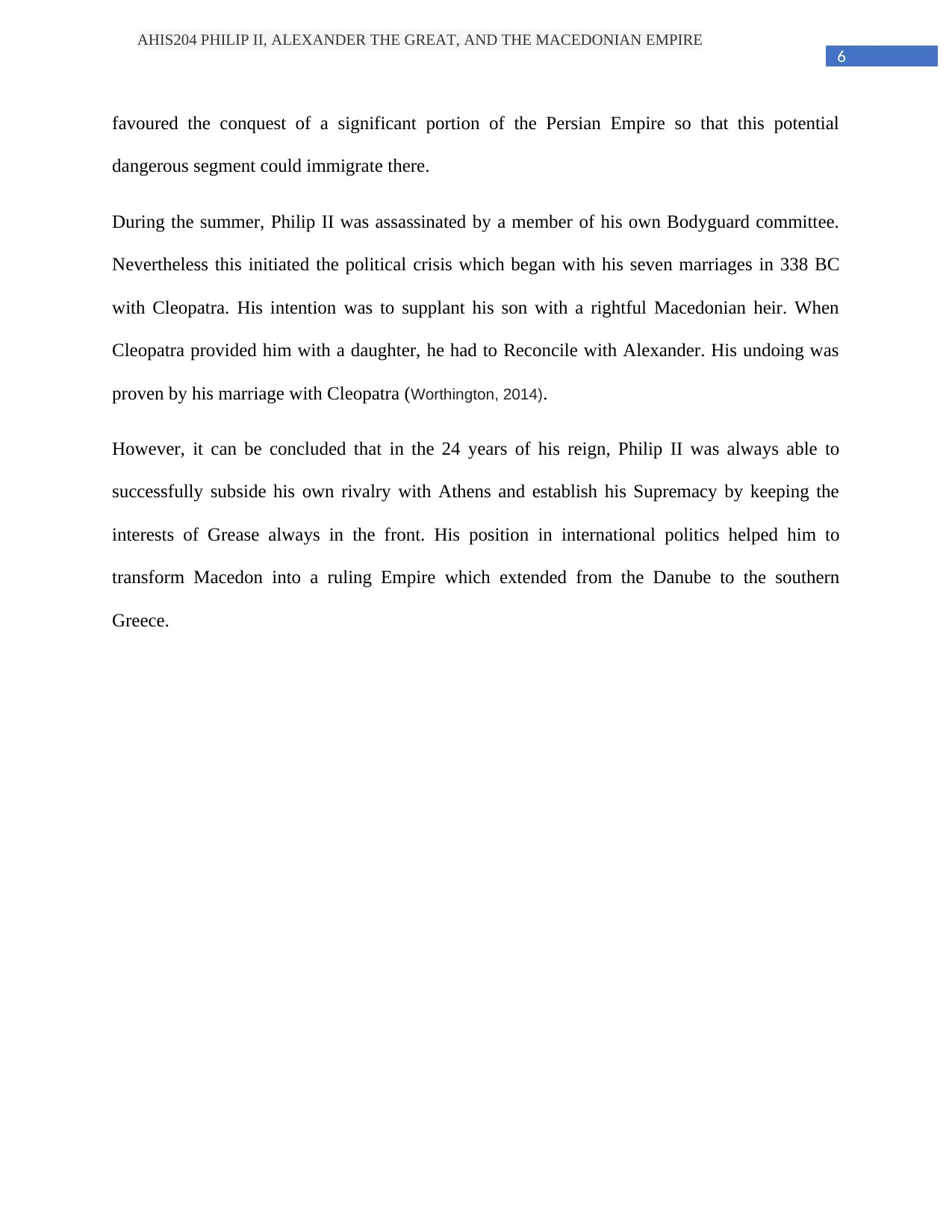
6
AHIS204 PHILIP II, ALEXANDER THE GREAT, AND THE MACEDONIAN EMPIRE
favoured the conquest of a significant portion of the Persian Empire so that this potential
dangerous segment could immigrate there.
During the summer, Philip II was assassinated by a member of his own Bodyguard committee.
Nevertheless this initiated the political crisis which began with his seven marriages in 338 BC
with Cleopatra. His intention was to supplant his son with a rightful Macedonian heir. When
Cleopatra provided him with a daughter, he had to Reconcile with Alexander. His undoing was
proven by his marriage with Cleopatra (Worthington, 2014).
However, it can be concluded that in the 24 years of his reign, Philip II was always able to
successfully subside his own rivalry with Athens and establish his Supremacy by keeping the
interests of Grease always in the front. His position in international politics helped him to
transform Macedon into a ruling Empire which extended from the Danube to the southern
Greece.
AHIS204 PHILIP II, ALEXANDER THE GREAT, AND THE MACEDONIAN EMPIRE
favoured the conquest of a significant portion of the Persian Empire so that this potential
dangerous segment could immigrate there.
During the summer, Philip II was assassinated by a member of his own Bodyguard committee.
Nevertheless this initiated the political crisis which began with his seven marriages in 338 BC
with Cleopatra. His intention was to supplant his son with a rightful Macedonian heir. When
Cleopatra provided him with a daughter, he had to Reconcile with Alexander. His undoing was
proven by his marriage with Cleopatra (Worthington, 2014).
However, it can be concluded that in the 24 years of his reign, Philip II was always able to
successfully subside his own rivalry with Athens and establish his Supremacy by keeping the
interests of Grease always in the front. His position in international politics helped him to
transform Macedon into a ruling Empire which extended from the Danube to the southern
Greece.
⊘ This is a preview!⊘
Do you want full access?
Subscribe today to unlock all pages.

Trusted by 1+ million students worldwide
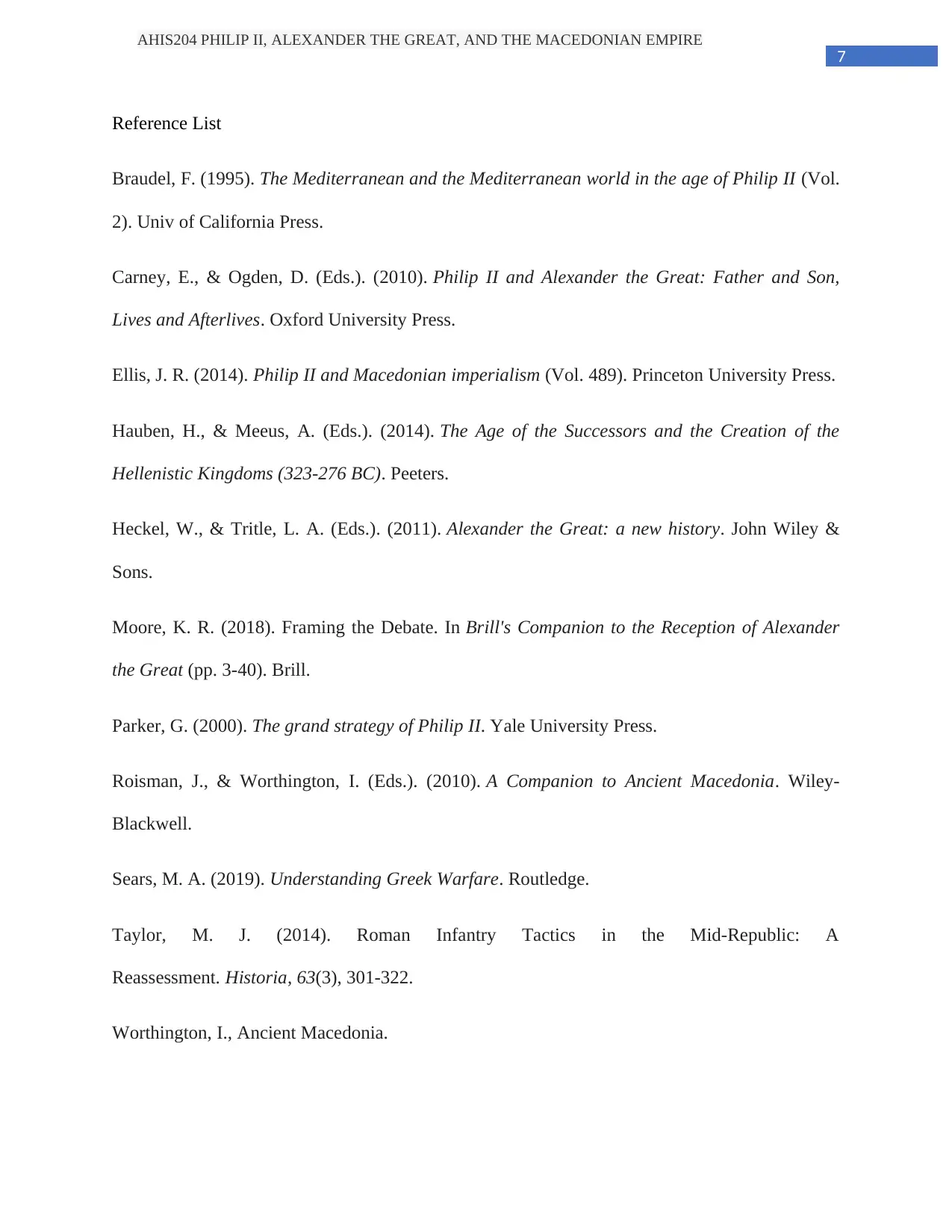
7
AHIS204 PHILIP II, ALEXANDER THE GREAT, AND THE MACEDONIAN EMPIRE
Reference List
Braudel, F. (1995). The Mediterranean and the Mediterranean world in the age of Philip II (Vol.
2). Univ of California Press.
Carney, E., & Ogden, D. (Eds.). (2010). Philip II and Alexander the Great: Father and Son,
Lives and Afterlives. Oxford University Press.
Ellis, J. R. (2014). Philip II and Macedonian imperialism (Vol. 489). Princeton University Press.
Hauben, H., & Meeus, A. (Eds.). (2014). The Age of the Successors and the Creation of the
Hellenistic Kingdoms (323-276 BC). Peeters.
Heckel, W., & Tritle, L. A. (Eds.). (2011). Alexander the Great: a new history. John Wiley &
Sons.
Moore, K. R. (2018). Framing the Debate. In Brill's Companion to the Reception of Alexander
the Great (pp. 3-40). Brill.
Parker, G. (2000). The grand strategy of Philip II. Yale University Press.
Roisman, J., & Worthington, I. (Eds.). (2010). A Companion to Ancient Macedonia. Wiley-
Blackwell.
Sears, M. A. (2019). Understanding Greek Warfare. Routledge.
Taylor, M. J. (2014). Roman Infantry Tactics in the Mid-Republic: A
Reassessment. Historia, 63(3), 301-322.
Worthington, I., Ancient Macedonia.
AHIS204 PHILIP II, ALEXANDER THE GREAT, AND THE MACEDONIAN EMPIRE
Reference List
Braudel, F. (1995). The Mediterranean and the Mediterranean world in the age of Philip II (Vol.
2). Univ of California Press.
Carney, E., & Ogden, D. (Eds.). (2010). Philip II and Alexander the Great: Father and Son,
Lives and Afterlives. Oxford University Press.
Ellis, J. R. (2014). Philip II and Macedonian imperialism (Vol. 489). Princeton University Press.
Hauben, H., & Meeus, A. (Eds.). (2014). The Age of the Successors and the Creation of the
Hellenistic Kingdoms (323-276 BC). Peeters.
Heckel, W., & Tritle, L. A. (Eds.). (2011). Alexander the Great: a new history. John Wiley &
Sons.
Moore, K. R. (2018). Framing the Debate. In Brill's Companion to the Reception of Alexander
the Great (pp. 3-40). Brill.
Parker, G. (2000). The grand strategy of Philip II. Yale University Press.
Roisman, J., & Worthington, I. (Eds.). (2010). A Companion to Ancient Macedonia. Wiley-
Blackwell.
Sears, M. A. (2019). Understanding Greek Warfare. Routledge.
Taylor, M. J. (2014). Roman Infantry Tactics in the Mid-Republic: A
Reassessment. Historia, 63(3), 301-322.
Worthington, I., Ancient Macedonia.
Paraphrase This Document
Need a fresh take? Get an instant paraphrase of this document with our AI Paraphraser

8
AHIS204 PHILIP II, ALEXANDER THE GREAT, AND THE MACEDONIAN EMPIRE
Worthington, I. (2014). By the Spear: Philip II, Alexander the Great, and the Rise and Fall of the
Macedonian Empire. Ancient Warfare and Civilizati.
AHIS204 PHILIP II, ALEXANDER THE GREAT, AND THE MACEDONIAN EMPIRE
Worthington, I. (2014). By the Spear: Philip II, Alexander the Great, and the Rise and Fall of the
Macedonian Empire. Ancient Warfare and Civilizati.
1 out of 8
Related Documents
Your All-in-One AI-Powered Toolkit for Academic Success.
+13062052269
info@desklib.com
Available 24*7 on WhatsApp / Email
![[object Object]](/_next/static/media/star-bottom.7253800d.svg)
Unlock your academic potential
Copyright © 2020–2026 A2Z Services. All Rights Reserved. Developed and managed by ZUCOL.





